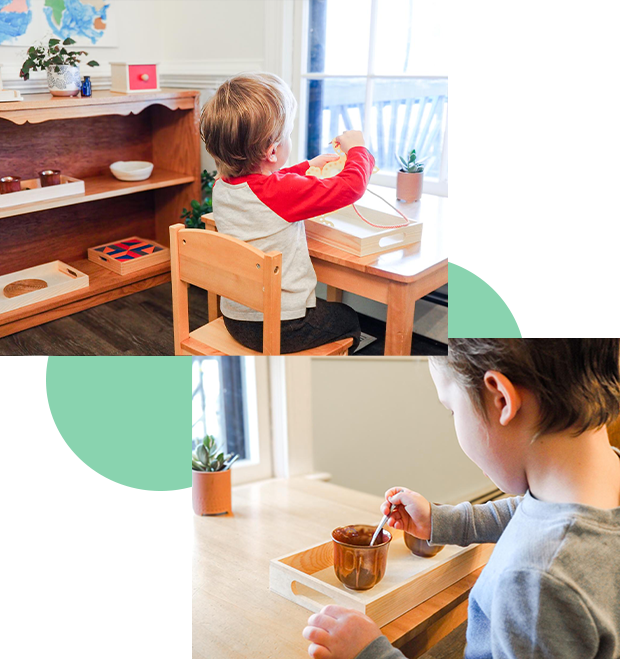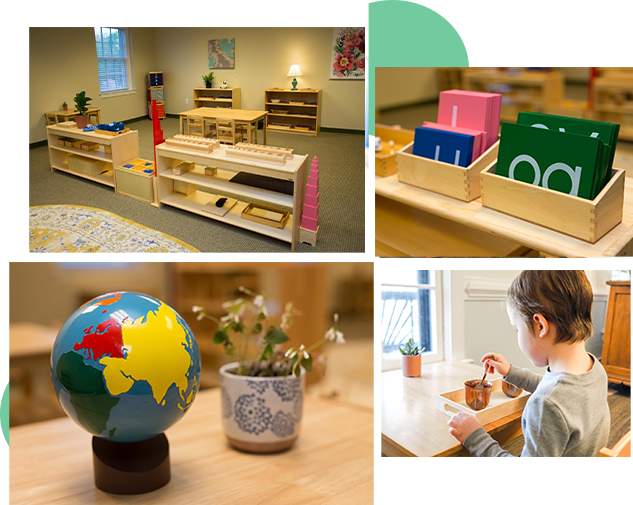


Established in 2024, this school is a dream-turned-reality for its owner, Emily Ball. CWM is dedicated to giving each of its students a quality and affordable education, rich in Montessori pedagogy. Located in the heart of Chesterfield County, Cedar Woods is pursuing a meaningful relationship with its community, beginning with Bethia United Methodist Church and their neighbors.
Montessori pedagogy is an educational approach developed by Dr. Maria Montessori in the early 1900s. It focuses on fostering a child’s natural desire to learn by providing an environment that encourages independence, exploration, and hands-on learning.
“The child gives us a beautiful lesson-that in order to form and maintain our intelligence, we must use our hands.” -Maria Montessori

 Maria Montessori with a young student learning the Demonstration Tray.
Maria Montessori with a young student learning the Demonstration Tray.
intellectually, socially, emotionally, and physically—by creating an environment that supports their natural growth and learning process.
Ms. Emily earned her AMI Montessori Diploma in the Primary classroom in 2015. She has taught as an assistant and lead teacher in several different schools and gained administrative experience as the Assistant Director of the Tutoring Club of Midlothian. In her spare time, Ms. Emily enjoys reading, knitting, and playing D&D.


The Montessori Primary Program is designed for children ages 3 to 6 and focuses on supporting their natural development in a hands-on, self-directed learning environment. It’s based on the educational philosophy of Dr. Maria Montessori, which emphasizes independence, freedom within limits, and respect for a child’s natural development.
The Prepared Environment is designed to be orderly, inviting, and accessible. Materials are child-sized, and everything is organized so that children can easily find what they need and return items when they’re done. Students learn that their work is complete only when it is back on the shelf, ready for the next student.
Children in the Montessori Primary Program are typically in mixed-age groups, spanning 3 years (for example, 3 to 6 years old). This fosters peer learning, where older children often help younger ones, reinforcing their own learning and promoting a sense of community.
Montessori education is based on the principle that children learn best through doing. In the primary program, children engage with materials that are tactile and concrete before moving on to abstract concepts. For example, they learn about numbers using physical objects like the Number Rods before they move on to written numerals.
Teachers (often called "guides") observe each child closely to understand their interests and developmental needs. They then provide individualized lessons that support each child’s progress at their own pace. Children are given independence, along with boundaries, to choose which work they would like to do.
“The greatest sign of success for a teacher is to be able to say, “The children are now working as if I did not exist.” -Maria Montessori

Children engage in activities that help develop coordination, independence, and self-care, such as pouring, sweeping, buttoning, and tying. These activities help build a foundation for more academic work later on.
These materials refine the senses and help children classify and understand the world around them. The Sensorial area is divided into the five senses: Sight, Sound, Taste, Smell, and Touch. Each sense uses concrete materials that isolate it from the other four, allowing the child to concentrate deeply.
Concrete materials like beads and number rods help children understand mathematical concepts. Students start with quantifying objects before learning the written numeral, then put both skills together to count, add, and subtract.
Students in the Montessori classroom learn the sounds each letter makes before learning the name of the letter. This is accomplished through use of the Sandpaper Letters, which give children the tactile experience of tracing a letter with a rough texture. Every conversation in the classroom is purposeful, giving students vocabulary for everything they do.
Includes geography, history, science, and the arts, helping children learn about the world and their place in it. Maria Montessori taught her students that they were Citizens of the World and encouraged them to learn as much as they could about other cultures.
While there is a great deal of freedom in choosing activities and working at one’s own pace, children are also taught to take responsibility for their choices, including caring for their environment and respecting others.
The Montessori Primary Program emphasizes fostering a love of learning and encourages curiosity, creativity, and problem-solving. It’s a holistic approach that supports emotional, social, intellectual, and physical development.